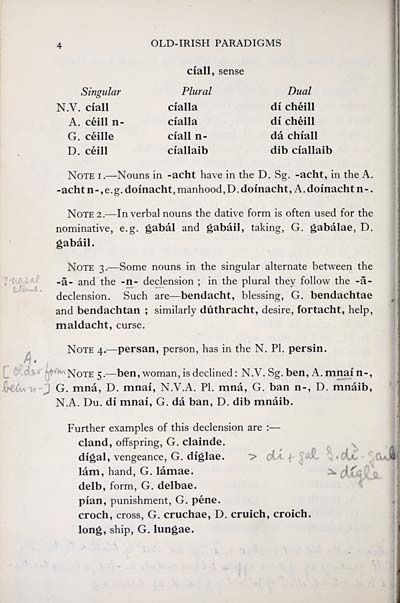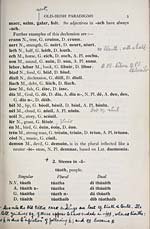Download files
Complete book:
Individual page:
Thumbnail gallery: Grid view | List view

OLD-IRISH PARADIGMS
cíall, sense
Sl/Ív^.
NoTE I. — Nouns in -acht have in the D. Sg. -acht, in the A.
-achtn-,e.g.doínacht,manhood,D.doínacht,A.doínachtn-.
NoTE2. — Inverbalnouns the dative form is often used for the
nominative, e.g. gabál and gabáil, taking, G. gabálae, D.
gabáil.
NoTE 3. — Some nouns in the singular alternate betMreen the
-á- and the -n- declension ; in the plural they foUow the -á-
declension. Such are — bendacht, blessing, G. bendachtae
and bendachtan ; similarly dúthracht, desire, fortacht, help,
maldacht, curse.
NoTE 4. — persan, person, has in the N. Pl. persin.
[[ i" cisi-í jjfr^^i NoTE 5. — ben,woman,isdeclined: N.V. Sg.ben, A.mnaí n-,
ílt^'M-J G. mná, D. mnaí, N.V.A. Pl. mná, G. ban n-, D. mnáib,
N.A. Du. dí mnaí, G. dá ban, D. dib mnáib.
Further examples of this declension are : —
cland, oífspring, G. clainde. .^
dígal, vengeance, G. díglae. > oU f ^aH ^ «ctu - ^
lám, hand, G. lámae. :k. ítjusj^
delb, form, G. delbae. f^
pían, punishment, G. péne.
croch, cross, G. cruchae, D. cruich, croich.
long, ship, G. lungae.
cíall, sense
Sl/Ív^.
NoTE I. — Nouns in -acht have in the D. Sg. -acht, in the A.
-achtn-,e.g.doínacht,manhood,D.doínacht,A.doínachtn-.
NoTE2. — Inverbalnouns the dative form is often used for the
nominative, e.g. gabál and gabáil, taking, G. gabálae, D.
gabáil.
NoTE 3. — Some nouns in the singular alternate betMreen the
-á- and the -n- declension ; in the plural they foUow the -á-
declension. Such are — bendacht, blessing, G. bendachtae
and bendachtan ; similarly dúthracht, desire, fortacht, help,
maldacht, curse.
NoTE 4. — persan, person, has in the N. Pl. persin.
[[ i" cisi-í jjfr^^i NoTE 5. — ben,woman,isdeclined: N.V. Sg.ben, A.mnaí n-,
ílt^'M-J G. mná, D. mnaí, N.V.A. Pl. mná, G. ban n-, D. mnáib,
N.A. Du. dí mnaí, G. dá ban, D. dib mnáib.
Further examples of this declension are : —
cland, oífspring, G. clainde. .^
dígal, vengeance, G. díglae. > oU f ^aH ^ «ctu - ^
lám, hand, G. lámae. :k. ítjusj^
delb, form, G. delbae. f^
pían, punishment, G. péne.
croch, cross, G. cruchae, D. cruich, croich.
long, ship, G. lungae.
Set display mode to: Large image | Transcription
Images and transcriptions on this page, including medium image downloads, may be used under the Creative Commons Attribution 4.0 International Licence unless otherwise stated. ![]()
| Early Gaelic Book Collections > Matheson Collection > Old-Irish paradigms and selections from the Old-Irish glosses > (20) |
|---|
| Permanent URL | https://digital.nls.uk/80949799 |
|---|
| Description | Items from a collection of 170 volumes relating to Gaelic matters. Mainly philological works in the Celtic and some non-Celtic languages. Some books extensively annotated by Angus Matheson, the first Professor of Celtic at Glasgow University. |
|---|
| Description | Selected items from five 'Special and Named Printed Collections'. Includes books in Gaelic and other Celtic languages, works about the Gaels, their languages, literature, culture and history. |
|---|

